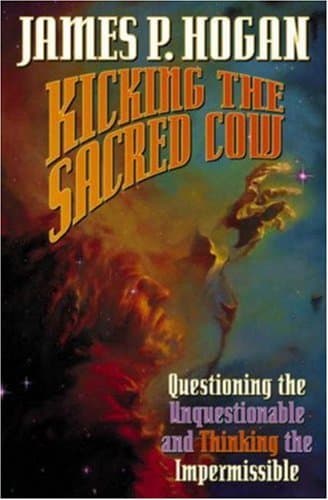
James P. Hogan, Kicking the Sacred Cow
Value For Money
James P. Hogan, Kicking the Sacred Cow
When you purchase through links on our site, we may earn an affiliate commission. Here's how it works.

User Reviews
Value For Money
Kicking The Sacred Cow James P. Hogan Ba
Kicking the Sacred Cow
James P. Hogan
Baen, Jul 2004, $24.00, 374 pp.
ISBN: 0743488288
James P. Hogan makes a strong case that much of the scientific interpretation of data pertaining to a wealth of subjects is subjective (tainted by the person's assumptions of what to expect or the community's bias) as opposed to an objective analysis. Using numerous examples to make his point like global warming, the expanding universe (big bang, crunch, and all in between), and evolution, etc., Mr. Hogan evaluates commonly known data but draws radically different conclusions from them. His point is not to disprove the accepted theories, but to demonstrate that other interpretations are as valid. At times the empirical data and Mr. Hogan's drill can become quite complex, which will lead to many readers like this reviewer taking several days and rereads to follow the logic on a particular topic. Though not quite as proven, Mr. Hogan believes a major problem is the government funding of science often leads to political decisions on grants and tenure. However, it is the alternative possibilities that make this an excellent insightful book. No cow remains sacred even the icons Darwin and Einstein are challenged. Ironically even Velikovsky, a 1950s radical, who's Worlds in Collision shook the science community, receives a boot or two. Terrific work that makes the case that big government spending big money stifles creative thinking with fantastic but complicated examples.
Harriet Klausner
Your review does not make this sound like a very academic/scientific book and his approach sounds incredibly flawed. If you're interested in this subject, and it is fascinating, the idea that science is political, I'd recommend that you find yourself a copy of The Structure of Scientific Revolutions by Thomas Kuhn, which is very readable, and The Birth of the Clinic by Michel Foucault.
It's really funny to watch scientists' reactions to these theories. I took a philosophy of science class with a bunch of Biology PhD students when I was working on my MA. They really didn't like being told that their experiments were subjective, the results only relative to the ways in which the projects were structured; but, as a historian, it's nothing we didn't already know about trying to reduce the world to a set of laws and equations.
Q&A
There are no questions yet.